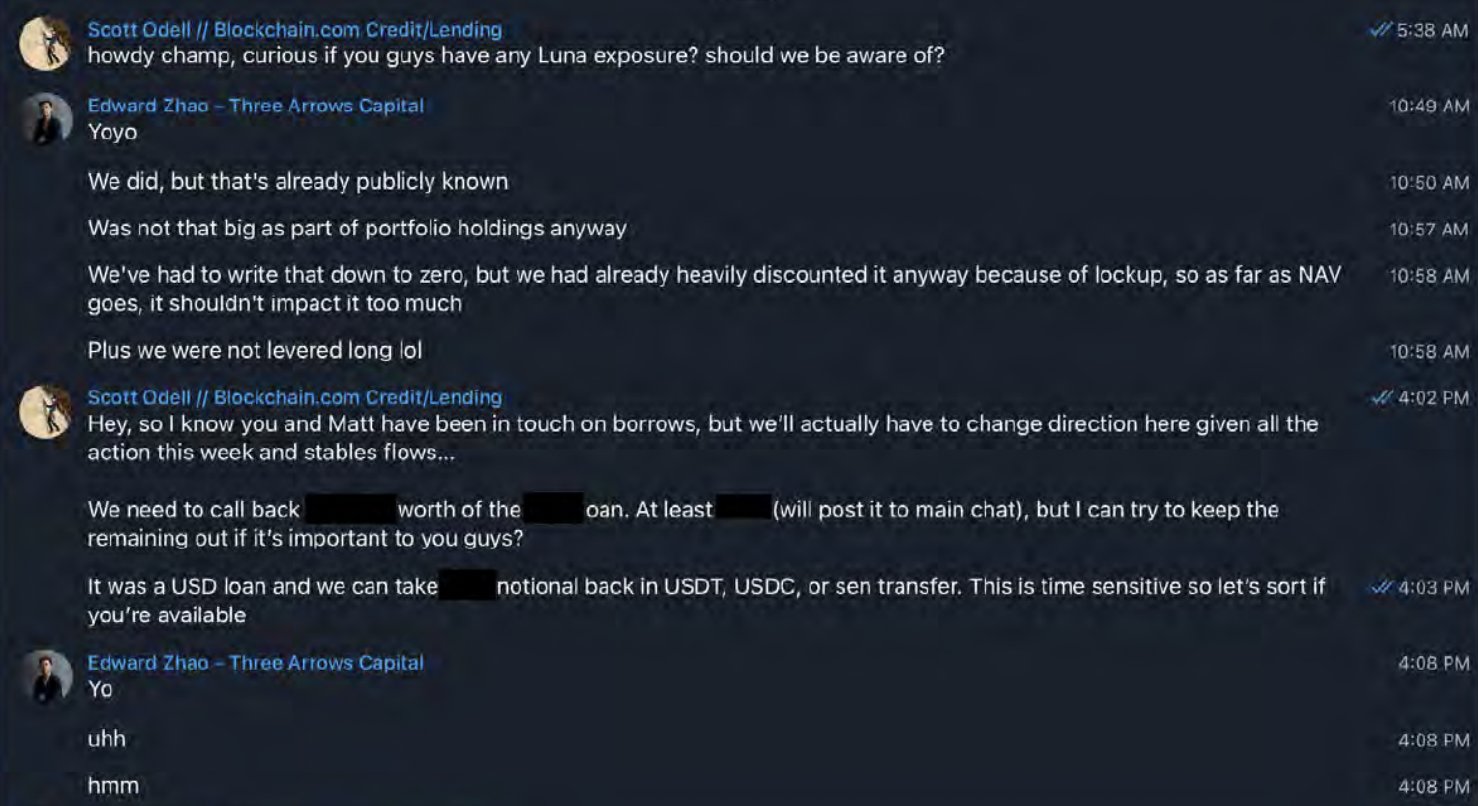Your collateral is my yacht
The wash up of the recently collapsed crypto lenders is only just beginning.
What has been revealed already in bankruptcy proceedings is outrageous, if not that surprising.
Crypto in court
We can start with the 3 Arrows Capital, one of the largest venture capital firms in the sector.
In total, it appears that 3AC owes in excess of $3 billion dollars. Its largest creditor is Genesis Trading who are owned by the Digital Currency Group, parent of Grayscale Asset Management. It will be painful but if anyone can afford it, it’s them.
The legal exhibits are something to behold. Highlights among the 1,000 page document include this setting out that the founders failed to reply to margin calls and instead … bought a yacht.

3AC founders Su Zhu and Kyle Davies made a down-payment on a luxury yacht. It's likely that borrowed money was used to fund it.
If that's not enough, the accompanying chat extract where Blockchain.com attempts to redeem their collateral is painful. They are now owed $270 million.

“Howdy champ”. Quite the opening when you are looking to margin call a quarter of a billion. In fact the language speaks to this being a relationship loan. Due diligence does not appear to have entered the frame at all, with predictable consequences.
The final reply to “can we have our money back” must surely go down in history.
“Yo, uhh, hmm”
CeFi v DeFi
The documents highlight something stark. None of what 3AC or Celsius (another bankrupt lender) were doing was anything approaching decentralised finance.
They were completely centralised businesses built exactly as per traditional infrastructure with people and intermediaries and relationships involved. The due diligence was weak or non-existent, the execution was poor, and it was simply a traditional loan done badly.
Decentralised finance does not work like this. In a decentralised model, the software simply liquidates your collateral at a pre-agreed agreed level and then repatriates it to the lender immediately. There is no opportunity for “Yo, uhh, hmm”.
The proof is that bankrupt parties like Celsius and 3AC paid back their DeFi loans because they could not stop that happening. You cannot default on those obligations even if you want to.
When things got sticky the centralised platforms simply halted trade because of extreme market conditions. The true DeFi platforms just carried on, including liquidating people as intended.
There is an interesting dynamic here to consider for the future. If you are lending to a counter-party who also borrows from a decentralised platform on the same terms, you almost certainly rank junior to the DeFi loan. The software will not hesitate to execute margin calls. It will not call and check. This might be bad for potential contagion, but well worth keeping in mind in future as more and more of these loans are written.
Nickel
We saw another example of centralised margin calls in action in the Nickel market. The London Metals Exchange outrageously suspended and cancelled some trades in April because a very large trader who was important to the market was sitting on an $11 billion loss. He was margin called and told the CEO of the London Metals Exchange personally that he wasn’t paying.
The LME then contrived to cancel trades and close the market until his losses shrank to a level he was comfortable with.
It’s totally unacceptable and of course those people on the other side of the trade are now suing for their $11 billion.
Whatever you think about decentralised finance (most people think it's finished), true DeFi is a massive improvement and a massive opportunity. Everyone knows the rules and everyone knows the software will follow them. In particular, the advantage of being more senior in the stack simply by having software look after your collateral is not yet well understood.
Perhaps the biggest hurdle is the market making the effort to learn about it, and in the current market, who could blame them for not doing so? It is more fun and less effort to conflate different issues and enjoy the pain of others. There is enormous upside though for those that do make the effort.
Performance
The core DeFi protocols like Aave and MakerDao are down around 60% in 12 months, but on a two-year horizon they have doubled in value. While they are still experimental in some ways, and difficult to value, they are bringing something new to the market and passing some incredibly stressful tests.
Regulators love stress tests but most of them are conducted on excel spreadsheets by APRA. Not so here. It’s real world stuff and real world money and the DeFi protocols are passing the test. They continued to work exactly as intended and during what was the equivalent of a Lehman style collapse for crypto.
What next?
I imagine the stream of outrageous headlines will continue and more horror stories will emerge in court filings over the next few months. We should not forget either that a lot of people have lost a lot of money, in particular those who posted their assets with Celsius to receive 20% interest. As always, if it looks too good to be true it probably is.
For the core decentralised protocols though it was business as usual. No calls to bankers or lawyers because there is no need. They executed their margin calls, satisfied their lender obligations and the lack of involvement from paid professionals is likely at the root of their unpopularity in the traditional finance sector.
What’s more, there have been no bailouts here. The system has been flushed, the over-leveraged have gone bankrupt and the system resets. From memory, that’s how it is supposed to work, right?
5 topics

